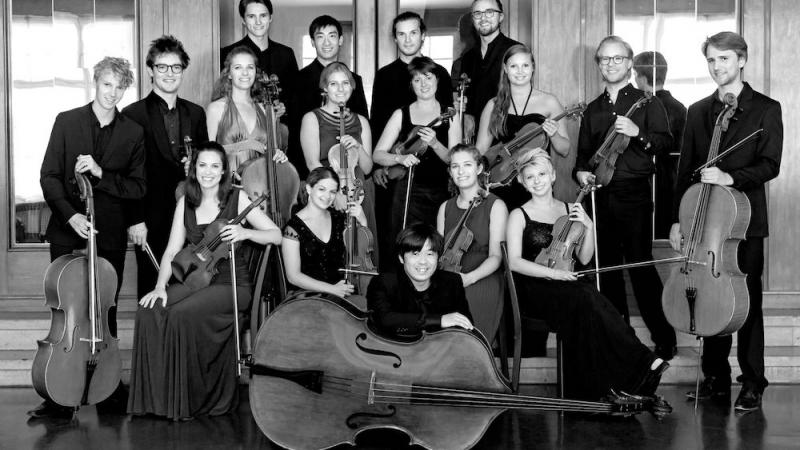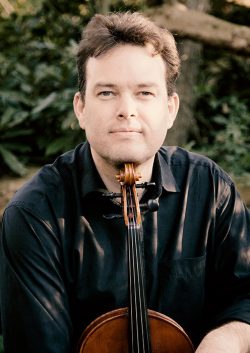Glennie, Lubbe, Ticciati, O/Modernt, Kings Place review - a Pergolesi-based dud | reviews, news & interviews
Glennie, Lubbe, Ticciati, O/Modernt, Kings Place review - a Pergolesi-based dud
Glennie, Lubbe, Ticciati, O/Modernt, Kings Place review - a Pergolesi-based dud
Expressive Schoenberg masterpiece the best of slim pickings

Some of the greatest pieces of the string orchestra repertoire are based on pre-existing pieces: the fantasias by Tippett and Vaughan Williams, on Corelli and Tallis respectively, treat their starting material with invention and sweep, creating something new, bigger and better than their sources. But throughout Lera Auerbach’s Dialogues on Stabat Mater (after Pergolesi) last night I felt nothing other than the desire to hear the Pergolesi original, unadorned and unmeddled-with.
Percussionist Evelyn Glennie, surely the main draw of the evening, spent most of the time lurking anonymously at the back. The one time she took centre-stage was for the opening improvisation, and this was difficult to take seriously. If you asked a comedy sketch group to parody an experimental piece on the subject of motherhood, for untuned percussion and violist also doing overtone singing, then what they’d come up with would be Mother of Sound. It was, sadly, a bit risible. And for all the delicate textures Glennie coaxed from her battery of instruments, the gap between the sincerity of her and Gareth Lubbe and the thin musical content was wide. It was at least short.
 Pergolesi’s Stabat Mater, written in 1736 in the final weeks of his short life, is an extraordinary piece, its harmony pushing at the edges of what was possible at the time, and its emotional impact shattering. It is written for two solo singers and string orchestra: in Auerbach’s Dialogues the singers are replaced by solo violin and viola. Much of her piece is straight or straight-ish transcription of the original. Other sections veer off into wildly dissonant and modernist textures that don’t seem to bear much relation to the Pergolesi. Very rarely is there any of the promised dialogue, a middle ground between the two composers. There were one or two striking episodes of hushed stasis, the players playing so quietly I was conscious of the bow-hair moving slowly over the strings, but these were fleeting moments in a very long piece. Evelyn Glennie’s vibraphone seemed an unnecessary add-on, sitting outside the ensemble and serving no obvious function. It blended as well as you would expect a vibraphone to blend with a string orchestra: not at all.
Pergolesi’s Stabat Mater, written in 1736 in the final weeks of his short life, is an extraordinary piece, its harmony pushing at the edges of what was possible at the time, and its emotional impact shattering. It is written for two solo singers and string orchestra: in Auerbach’s Dialogues the singers are replaced by solo violin and viola. Much of her piece is straight or straight-ish transcription of the original. Other sections veer off into wildly dissonant and modernist textures that don’t seem to bear much relation to the Pergolesi. Very rarely is there any of the promised dialogue, a middle ground between the two composers. There were one or two striking episodes of hushed stasis, the players playing so quietly I was conscious of the bow-hair moving slowly over the strings, but these were fleeting moments in a very long piece. Evelyn Glennie’s vibraphone seemed an unnecessary add-on, sitting outside the ensemble and serving no obvious function. It blended as well as you would expect a vibraphone to blend with a string orchestra: not at all.
All of this made it more frustrating that the playing was very good. Hugo Ticciati is a wonderful musician, visibly engaged with the other O/Modernt players and audibly doing his best to advocate for the piece with committed and passionate playing. He and Gareth Lubbe (pictured above) combined well in their duo passages, but their skill was wasted on this music.
The Schoenberg that followed the interval is a proper masterpiece, heard here in its ‘orchestral’ scoring, although, with only 17 players led by Ticciati from the violin, it was really an expanded chamber music. The players found a wonderful range of colour, from the creepy darkness of the opening, to the later ecstatic wide-spaced chords that sound like the sun rising. The harmony owes a lot to Tristan and Isolde, restless, never resolving, full of angst and high emotion. But O/Modernt also found beautiful moments of little or no vibrato, like a palate-cleanser in the middle of a rich meal. The only misjudgement was Lubbe adding vocal overtones to the final chord. But, I suppose, overtone singers gonna overtone sing.
The concert should have ended there, but Albert Schnelzer’s Apollonian Dances were tacked on, possibly just to get Evelyn Glennie back on stage. A perfectly serviceable piece by a composer I don’t know, well-scored and with passages of suitably Apollonian abandon, it felt superfluous after the dark brooding of the Schoenberg.
rating
Explore topics
Share this article
The future of Arts Journalism
You can stop theartsdesk.com closing!
We urgently need financing to survive. Our fundraising drive has thus far raised £49,000 but we need to reach £100,000 or we will be forced to close. Please contribute here: https://gofund.me/c3f6033d
And if you can forward this information to anyone who might assist, we’d be grateful.

Subscribe to theartsdesk.com
Thank you for continuing to read our work on theartsdesk.com. For unlimited access to every article in its entirety, including our archive of more than 15,000 pieces, we're asking for £5 per month or £40 per year. We feel it's a very good deal, and hope you do too.
To take a subscription now simply click here.
And if you're looking for that extra gift for a friend or family member, why not treat them to a theartsdesk.com gift subscription?
more Classical music
 Bizet in 150th anniversary year: rich and rare French offerings from Palazzetto Bru Zane
Specialists in French romantic music unveil a treasure trove both live and on disc
Bizet in 150th anniversary year: rich and rare French offerings from Palazzetto Bru Zane
Specialists in French romantic music unveil a treasure trove both live and on disc
 Scottish Chamber Orchestra, Ibragimova, Queen’s Hall, Edinburgh review - rarities, novelties and drumrolls
A pity the SCO didn't pick a better showcase for a shining guest artist
Scottish Chamber Orchestra, Ibragimova, Queen’s Hall, Edinburgh review - rarities, novelties and drumrolls
A pity the SCO didn't pick a better showcase for a shining guest artist
 Kilsby, Parkes, Sinfonia of London, Wilson, Barbican review - string things zing and sing in expert hands
British masterpieces for strings plus other-worldly tenor and horn - and a muscular rarity
Kilsby, Parkes, Sinfonia of London, Wilson, Barbican review - string things zing and sing in expert hands
British masterpieces for strings plus other-worldly tenor and horn - and a muscular rarity
 From Historical to Hip-Hop, Classically Black Music Festival, Kings Place review - a cluster of impressive stars for the future
From quasi-Mozartian elegance to the gritty humour of a kitchen inspection
From Historical to Hip-Hop, Classically Black Music Festival, Kings Place review - a cluster of impressive stars for the future
From quasi-Mozartian elegance to the gritty humour of a kitchen inspection
 Shibe, LSO, Adès, Barbican review - gaudy and glorious new music alongside serene Sibelius
Adès’s passion makes persuasive case for the music he loves, both new and old
Shibe, LSO, Adès, Barbican review - gaudy and glorious new music alongside serene Sibelius
Adès’s passion makes persuasive case for the music he loves, both new and old
 Anja Mittermüller, Richard Fu, Wigmore Hall review - a glorious hall debut
The Austrian mezzo shines - at the age of 22
Anja Mittermüller, Richard Fu, Wigmore Hall review - a glorious hall debut
The Austrian mezzo shines - at the age of 22
 First Person: clarinettist Oliver Pashley on the new horizons of The Hermes Experiment's latest album
Compositions by members of this unusual quartet feature for the first time
First Person: clarinettist Oliver Pashley on the new horizons of The Hermes Experiment's latest album
Compositions by members of this unusual quartet feature for the first time
 Gesualdo Passione, Les Arts Florissants, Amala Dior Company, Barbican review - inspired collaboration excavates the music's humanity
At times it was like watching an anarchic religious procession
Gesualdo Passione, Les Arts Florissants, Amala Dior Company, Barbican review - inspired collaboration excavates the music's humanity
At times it was like watching an anarchic religious procession
 Classical CDs: Camels, concrete and cabaret
An influential American composer's 90th birthday box, plus British piano concertos and a father-and-son duo
Classical CDs: Camels, concrete and cabaret
An influential American composer's 90th birthday box, plus British piano concertos and a father-and-son duo
 Cockerham, Manchester Camerata, Sheen, Martin Harris Centre, Manchester review - re-enacting the dawn of modernism
Two UK premieres added to three miniatures from a seminal event of January 1914
Cockerham, Manchester Camerata, Sheen, Martin Harris Centre, Manchester review - re-enacting the dawn of modernism
Two UK premieres added to three miniatures from a seminal event of January 1914
 Kempf, Brno Philharmonic, Davies, Bridgewater Hall, Manchester review - European tradition meets American jazz
Bouncing Czechs enjoy their Gershwin and Brubeck alongside Janáček and Dvořák
Kempf, Brno Philharmonic, Davies, Bridgewater Hall, Manchester review - European tradition meets American jazz
Bouncing Czechs enjoy their Gershwin and Brubeck alongside Janáček and Dvořák
 Solomon, OAE, Butt, QEH review - daft Biblical whitewashing with great choruses
Even a top soprano and mezzo can’t make this Handel paean wholly convincing
Solomon, OAE, Butt, QEH review - daft Biblical whitewashing with great choruses
Even a top soprano and mezzo can’t make this Handel paean wholly convincing

Add comment